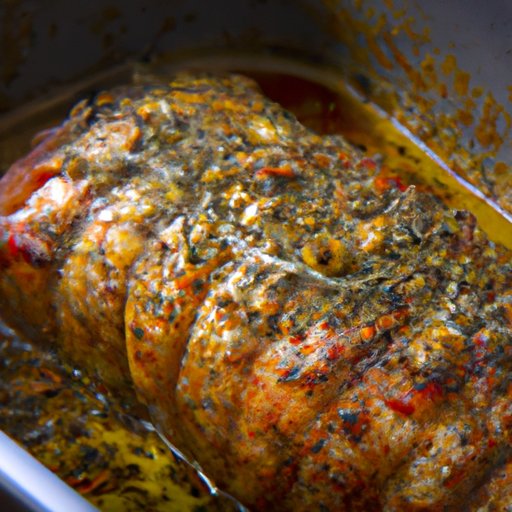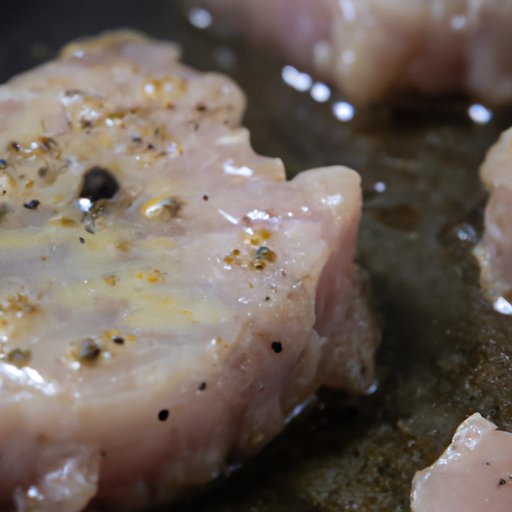
Introduction
Pork tenderloin is a delicious and healthy protein that can be included in any meal. Perfectly baked pork tenderloin is juicy, tender, and packed with flavor. However, cooking pork tenderloin can be tricky if you don’t know the right way. In this article, we will provide you with a comprehensive guide on how to bake pork tenderloin perfectly every time.
5 Simple Steps to Perfectly Baking Pork Tenderloin Every Time
Prepping the Pork: Trimming, Seasoning, and Marinating for Extra Flavor
The first step in cooking pork tenderloin is to prep it properly. Start by removing any excess fat or silver skin from the meat. Once you have trimmed the pork, season it with salt and pepper or your favorite seasoning blend. For an extra burst of flavor, marinate the pork in your preferred marinade for at least 30 minutes.
Preheating the Oven and Choosing the Right Baking Dish
Preheat your oven to 400 degrees Fahrenheit. When baking pork tenderloin, it is essential to use a baking dish that is not too large. The perfect size is one that accommodates the tenderloin closely, allowing space for the hot air to circulate around it. A small baking dish will trap the heat and might cause uneven cooking.
Cooking the Pork: The Ideal Temperature and Cooking Time
Place the pork in the preheated oven and bake it for 20-25 minutes or until the internal temperature reaches 145 degrees Fahrenheit. Depending on the size of your pork tenderloin, you might need to adjust the cooking time. Use a meat thermometer to ensure that the meat is cooked thoroughly. Overcooking pork tenderloin can make it tough and dry, so it is essential to monitor it closely.
Checking for Doneness and Resting the Pork for Optimal Tenderness
After cooking the pork, remove it from the oven and let it rest on a cutting board for at least five minutes. During this time, the pork will continue to cook and settle, resulting in a more juicy and flavorful end product. Use a sharp knife to cut the meat into thin, even slices, and serve immediately.
Tips and Tricks for Perfecting Your Pork Tenderloin Every Time
There are some additional tips to keep in mind when baking pork tenderloin. If you have the time, consider browning the pork on the stovetop before roasting to add flavor. You could also use a meat injector to add more flavor to the meat. Finally, check the internal temperature of the pork before resting it on the cutting board to ensure that it is safe to eat.
Expert Tips for Juicy and Flavorful Pork Tenderloin
Choosing the Right Cut of Pork Tenderloin
To ensure juicy and flavorful pork tenderloin every time, start by choosing the right cut. Look for pork tenderloin that has a deep red color with a small amount of marbling. Avoid pork tenderloin that has a lot of fat or is discolored.
Seasonings and Flavorings that Complement the Pork’s Natural Flavor
Pork tenderloin is tender and has a mild taste that complements several flavorings and seasonings. However, when seasoning pork tenderloin, ensure that your spices and marinades do not overpower the pork’s natural flavor. Some seasoning blends and marinades that complement pork tenderloin include garlic, thyme, rosemary, honey, soy sauce, ginger, and mustard.
Step-by-Step Instructions for Achieving the Best Results
When preparing pork tenderloin, follow the steps outlined earlier in this article. Start by trimming the excess fat and silver skin, seasoning the meat with salt, pepper, or your preferred blend of spices, and marinating it if desired. Preheat the oven to 400 degrees Fahrenheit before placing the pork in a baking dish and roasting it for 20-25 minutes. Rest the meat on a cutting board for five minutes before carving it into thin slices and serving.

Mistakes to Avoid When Baking Pork Tenderloin
Common Mistakes People Make When Baking Pork Tenderloin
Baking pork tenderloin can be challenging, and it is easy to make mistakes that lead to dry or tough meat. Some common mistakes to avoid include using a baking dish that is too large, overcooking the meat, and skipping the resting period after cooking.
Suggestions for Avoiding These Mistakes to Ensure the Perfect Pork Every Time
To avoid common mistakes when baking pork tenderloin, use a correctly sized baking dish, monitor the meat’s internal temperature, and let the pork rest for five minutes before carving it. Additionally, you could try basting the pork with its juice or marinade to keep it moist and tender. This will result in a tastier pork tenderloin every time.
Different Ways to Spice Up Your Pork Tenderloin Recipe
Suggestions for Adding Flavor to Your Pork Tenderloin, Including Spices, Rubs, Marinades, and Fruit
There are several ways to add flavor to your pork tenderloin recipe. You could incorporate a blend of spices and herbs, rubs, marinades, or fruit. For example, you could use a rosemary-thyme rub for a herby flavor or a sweet and spicy marinade that includes honey, soy sauce, and chili flakes. You could also incorporate roasted apples or pears for a sweet and savory flavor.
Step-by-Step Instructions for Incorporating These Ingredients Into Your Recipe
To incorporate different flavors into your pork tenderloin recipe, start by choosing your preferred seasoning or marinade. Follow the instructions for prepping the meat outlined earlier in this article. Then, cover the pork with your chosen seasoning, rub, or marinade, ensuring that it is adequately coated. Cook the pork as directed before letting it rest for five minutes. Finally, slice the pork and serve with your preferred side dishes.
Pork Tenderloin: A Versatile Entree for Any Occasion
Serving Suggestions: Sandwiches, Salads, and Pasta Dishes
Pork tenderloin is an incredibly versatile entree that can be served in several ways. You could slice the cooked pork and use it to make sandwiches or wraps. Alternatively, you could serve the pork cold in a salad or add hot chunks to a pasta dish. The possibilities are endless!
Ideas for Incorporating Pork Tenderloin Into Your Regular Meal Planning
Pork tenderloin is a healthy protein that can be enjoyed regularly. Consider incorporating it into your regular meal planning by prepping and cooking a large batch and freezing it for later. You could also slice the cooked pork and add it to soups, stews, or stir-fries for a satisfying and flavorful meal.
Healthy Cooking Tips for Pork Tenderloin
Suggestions for Reducing the Fat Content of Your Pork Tenderloin Recipe
Pork tenderloin is a relatively lean protein, but there are ways to reduce its fat content. Start by trimming any excess fat or silver skin from the meat before cooking. Additionally, consider using a marinade that includes citrus juice or vinegar to tenderize the meat and reduce the need for added oil. Finally, skip the sugar-laden sauces or glazes and opt for herbs, spices, or a simple olive oil and balsamic vinegar dressing.
Tips for Incorporating More Vegetables for a Healthier Dish
Pork tenderloin pairs well with several types of vegetables. Consider adding roasted or grilled vegetables to your pork tenderloin recipe for a healthier meal. Some excellent options include roasted Brussels sprouts, sauteed green beans, or grilled asparagus.
Conclusion
Baking the perfect pork tenderloin can be challenging, but by following the steps and tips in this article, you can achieve tender, juicy, and flavorful meat every time. Remember to choose the right cut of pork, use appropriate seasoning or marinade, and monitor the meat’s internal temperature for optimal results. Additionally, consider incorporating different flavors and vegetables into your recipes for a diverse and satisfying meal.




